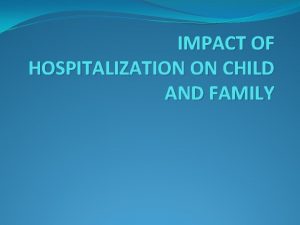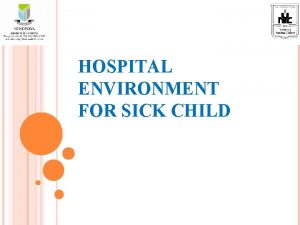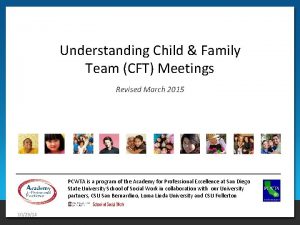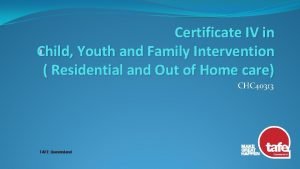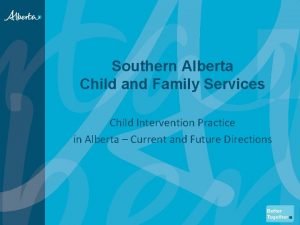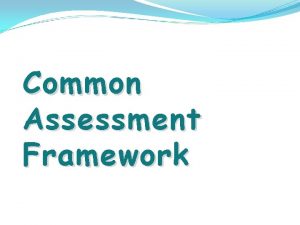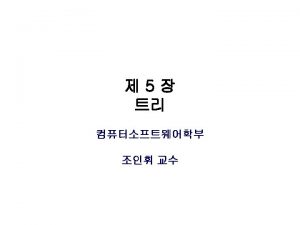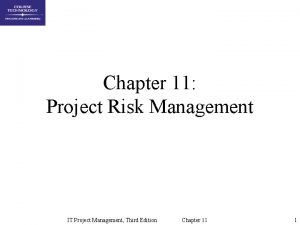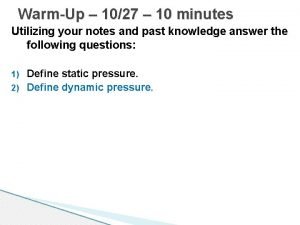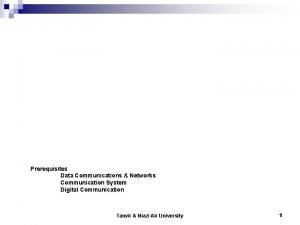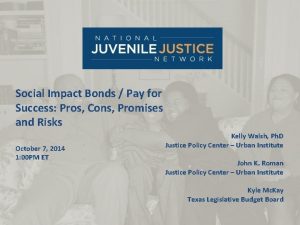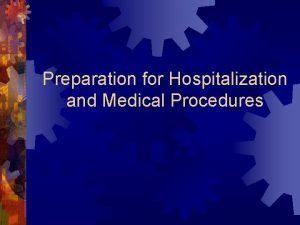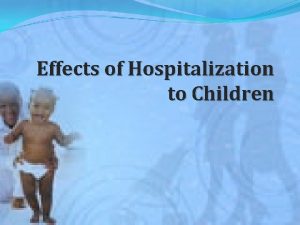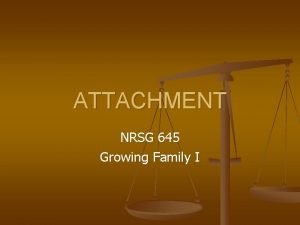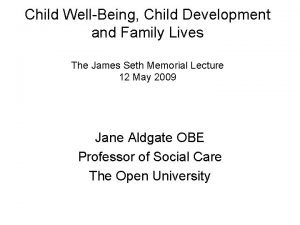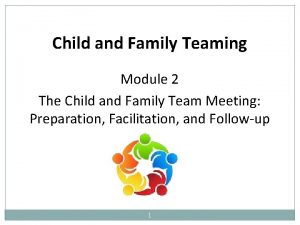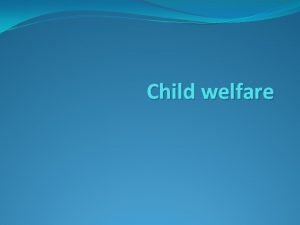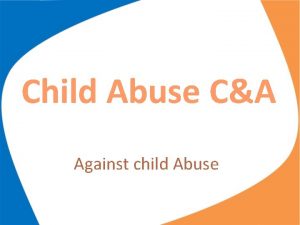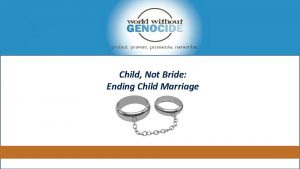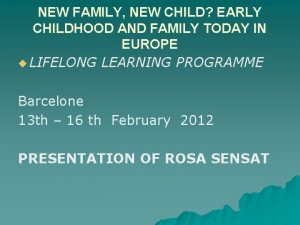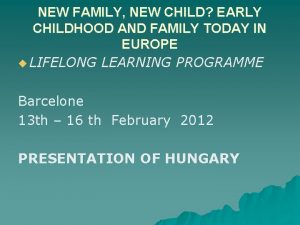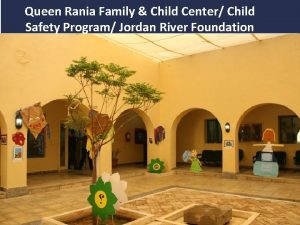IMPACT OF HOSPITALIZATION ON CHILD AND FAMILY v























- Slides: 23

IMPACT OF HOSPITALIZATION ON CHILD AND FAMILY

v. The child will go stress for due to hospitalization. v. They do feel like loss of control. v. The child may get injury and pain during treatment. v. Parental reaction of the children. v. Sibling reaction. v. Family role in ill child during hospitalization. v. Nurses role for ill child during hospitalization.

THE CHILD GET STRESS OF HOSPITALIZATION AND REACTION 1. The children have stress before admission during hospitalization, and after discharge. 2. Hospitalization of the children and illness are the crisis of children: a) stress is a change from the usual state of health and environment. b)The child have less defense mechanism to resolve the stress.

3. Major stress on the hospitalization includes: a)Separation b)Loss of control c)Bodily injury d)Pain

Separation anxiety 1. Middle infancy, children are commonly affected in a anaclitic depression Anaclitic depression is dividing in three phases: 1. Phases of protest 2. Phase of despair (Loss of hope) 3. Phases of detachment (Denial)

1. PHASES OF PROTEST Later infancy: § Cries, screams § Searches for parent with eyes § Avoids and rejects contact with strangers. Toddlerhood: § Vulnerable attacks

�Physical attacks (kicks, bites, hits, pinches) �Attempt to escape to find parents. 2. PHASE OF DESPAIR (LOSS OF HOPE) § Inactive § Withdrawal from family members § Depressed, sad § Lack of interest with environment

3. PHASES OF DETACHMENT (DENIAL) § Shows increased interest in surroundings. § Interact with stranger or familiar care giver. § It is usually occurs after prolonged separation from parents.

LOSS OF CONTROL 1) When the child hospitalized, the child has lack of control and coping skill due to therapeutic management. 2) Hospital situation is to stimulate sight, sound, smell.

3. The hospital experience can cause slow development temporarily and at worst permanently while restrict and the major area of loss of control in terms of physical restriction, altered routine or rituals.

BODILY INJURY AND PAIN 1. To prevent fear, injury and pain in the children. 2. Who have medical fear in the adult period they are experienced more fear of pain. 3. Nurses should evaluate the pain.

PARENTAL REACTION 1. To decreased parent-child relationship during hospitalized children. 2. Initially the parent will not believe the illness of child. 3. Some of the influencing factors are agreed. The parent will get angry due to illness guilt, fear, anxiety, frustration and depression.

4. Factors affecting parent’s reaction to their child’s illness. a)Seriousness of the threat to the child. b)Previous experience with illness or hospitalization. c)Medical procedure involved in diagnosis and treatment. d)Available support systems.

e) Personal ego strengths. f)Previous coping abilities. g)Additional stresses on the family system. i)Cultural and religious beliefs. j)Communication patterns among family members.

SIBLING REACTION 1. Any one of the siblings admitted in the hospital. They are feel alone, fear, anxiety and worry. 2. When parents show attention to the ill child, at the time sibling get anger, jealousy and guilt. 3. They are received little information about the ill child. 4. Perceived their parents to be treating them differently

FAMILY ROLE FOR ILL-CHILD DURING HOSPITALIZATION 1. The family persons are affecting like loss of parenting, sibling, and off spring roles. These are affected in the family members. 2. The parents should provide in specialized attention to the sick child. 3. The other children may regards , to unfair and interpret the parent’s attitude towards them as a rejection.

4. Ill child may feel jealous for other siblings that time the parents has to concentrate equally. 5. Without understanding the interpersonal relationships between siblings and parents are most likely to blame the well children loss of status within either their family or in social group.

NURSES ROLE FOR ILL CHILD DURING HOSPITALIZATION 1. PREPARATION FOR THE HOSPITALIZATION. ØNurse should explain about the child status, severity of disease condition. ØNurse should encourage the parents to hospitalize with child. ØNurse should explain about the merits and demerits of the treatment. ØTo develop coping skill among children, child

has to maintain IPR with other children who are admitted in hospital. ØNurse should use toys, puppet to meet play needs and allow drawing picture, reading books, videos and films etc. . So the child will be relieved from fear and maladjustment in hospital. ØThe nurse may help to parent to feel more secure and calm in the hospital and the child feel less anxious.

ØGet the informed consent. ØNurse should assess the behavior of children and their parents to understand feeling of their behavior reflects. ØThe nurse also share information about the children and their parents, so they can understand the behavior. ØTherapeutic touch will bring the caring attitude to the children and to parents.

ØProvide personal care to the children during hospitalization to prevent the degree of illness. ØThe nurse should assess the level of growth and development already achieved before the illness. ØThe nurse is responsible to record the intake and output.

ØNurse can encourage the parent’s participation in their child care and activities. ØNurse must be perceptive of the loneliness and fear of the child who is unable to understand the aspect of care.

THANK YOU
 Effect of hospitalization on the family of the child
Effect of hospitalization on the family of the child Hospital environment for a sick child ppt
Hospital environment for a sick child ppt What is a cft meeting
What is a cft meeting Child youth and family services act
Child youth and family services act Chcccs
Chcccs Bza first nation
Bza first nation Child intervention practice framework
Child intervention practice framework Child family investigator
Child family investigator Lorain county child protective services
Lorain county child protective services Kina gbezhgomi child and family services
Kina gbezhgomi child and family services What is the full form of caf
What is the full form of caf Unesco child and family research centre
Unesco child and family research centre Left child right child tree representation
Left child right child tree representation Conjugal family
Conjugal family Varies from family to family on the periodic table.
Varies from family to family on the periodic table. Blended family vs binuclear
Blended family vs binuclear Projectile apparatus with impact board and launching ramp
Projectile apparatus with impact board and launching ramp Risk assessment project example
Risk assessment project example Impact pressure chamber and lines
Impact pressure chamber and lines Impact of computers in business
Impact of computers in business What do you mean by renaissance
What do you mean by renaissance Pursuit of sovereignty and impact of partition essays
Pursuit of sovereignty and impact of partition essays Digital communications and networks
Digital communications and networks Pay for success bonds
Pay for success bonds
